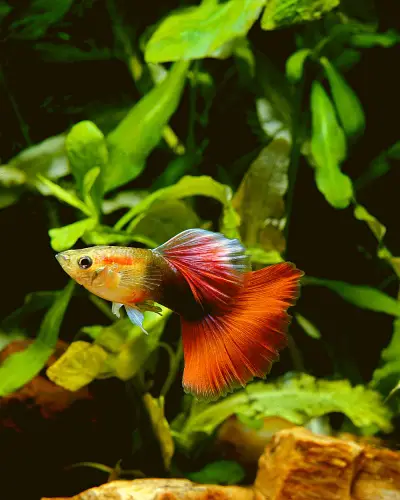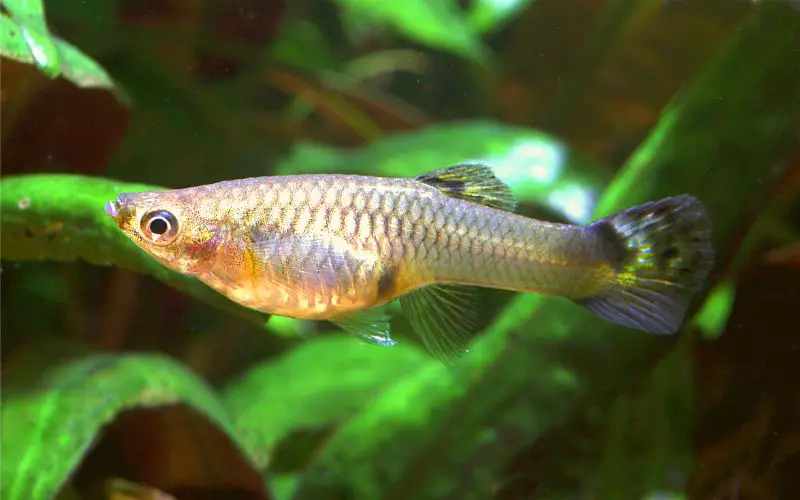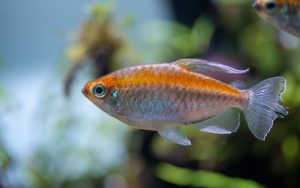As a guppy fish owner, it’s essential to understand the potential Guppy Diseases that can affect your beloved pets. Guppies are hardy and beautiful freshwater fish that are popular among fish keepers. However, like any other living organism, they are susceptible to illnesses.
This complete guide will explore the five deadly guppies diseases you must avoid.
By learning about these diseases and their symptoms, you’ll be better equipped to provide the necessary care and maintain a healthy environment for your guppies.

Various factors, including poor water quality, parasites, bacteria, and viruses, can cause guppy fish diseases. It’s crucial to maintain a clean and well-balanced aquarium environment to prevent these diseases from occurring.
Common symptoms of guppy diseases include changes in behavior, stop eating, gasp for air, physical deformities, and discoloration.
By paying attention to these signs of guppy fish diseases, you can detect potential health problems early on and take the necessary steps to address them.
Table of Contents
Toggle5 Common Guppy Fish Diseases and How to Treat
1. Dropsy: A Grave Illness
Dropsy is a severe and often fatal condition that affects guppies and other fish species. It is characterized by fluid accumulation in the fish’s body, leading to bloating and swelling. Dropsy guppy issue can be caused by bacterial infections affecting the fish’s internal organs.
Poor water quality, overcrowded tanks, and stress can also contribute to the development of this disease. If you notice your guppy displaying symptoms such as a bloated abdomen, raised scales, and lethargy, it’s crucial to isolate the infected fish and seek veterinary care promptly.
2. Fin and Tail Rot: A Common Issue
Fin and tail rot is a prevalent guppy disease caused by bacteria such as Aeromonas and Pseudomonas. It typically starts with fraying or discoloring the fins and tails, gradually progressing to rotting and disintegration. Poor water quality, physical injuries, and stress can weaken a guppy’s immune system, making them more susceptible to this disease. To prevent Fin and tail rot, maintain excellent water quality, provide a well-balanced diet, and promptly treat any physical injuries your guppies may sustain.
3. Swim Bladder Disorder: Affecting Mobility
Swim bladder disorder (SBD) is a condition that affects a fish’s ability to control its buoyancy. Guppies with swim bladder disorder may exhibit symptoms such as stop eating, trouble swimming erratically, floating near the water’s surface, gasp for air, or sinking to the bottom of the tank.
Various factors, including overfeeding, constipation, or physical deformities, can cause this disorder. Adjusting the guppy’s diet, feeding smaller portions, and providing a well-maintained aquarium with appropriate water conditions can help manage and prevent swim bladder disorder.
4. Velvet Disease: A Parasitic Menace
Velvet disease, also known as Rust or Gold Dust disease, is caused by a parasitic organism called Piscinoodinium pillulare. It appears as a yellowish-gold dust-like coating on the fish’s body, giving it a velvety appearance. Infected guppies may experience rapid breathing, loss of appetite, and clamped fins.
If left untreated, the velvet oodinium disease can spread quickly and affect the entire fish colony. To combat this parasitic menace, quarantine new fish before introducing them into the main tank, maintain optimal water quality, and treat the whole aquarium with appropriate medications.
5. Red Blood Spot Disease: An Unsettling Sight
Red blood spot disease, also known as Hemorrhagic Septicemia, is a bacterial infection that causes small red spots on the fish’s body. These spots can be a sign of internal bleeding and indicate a severe underlying illness. Infected guppies may become lethargic, lose their appetite, and display rapid gill movement.
Red blood spot disease is highly contagious and can spread rapidly throughout the fish population. Promptly isolate infected fish and consult with a veterinarian to determine the appropriate treatment, which may include antibiotics.
What Are Some Common Reasons for Diseases or Parasites in Guppies?
Guppies are hardy fish that can fight off most diseases and parasites, but some common causes can make them vulnerable to illness.
One of the most significant factors is poor water quality, as dirty or contaminated water can weaken the fish’s immune system and lead to disease or protozoan parasite infestations.

Keeping their tank clean and well-maintained is crucial, with appropriate filtration and regular water changes. To maintain a healthy fish tank environment for your guppies,
Another cause of diseases and parasites in guppies is aggressive fish in the tank. Some species may attack and injure your guppies, leaving them vulnerable to infections and other health issues.
It’s essential to research the compatibility of different fish species before adding them to your community tank and ensure that they get along well with your guppies.
If you notice that one or more of your guppies are sick, it’s crucial to isolate them from the rest of the fish tank immediately.
Sick guppies can quickly spread diseases or parasites to their tankmates, and early intervention can prevent further damage to the rest of your fish population.
You can then treat your fish with appropriate medications or seek advice from a veterinarian or an experienced fishkeeper to determine the best course of action.
How To Treat Your Fish Tank with Medication?
Treating your fish tank with medication is essential to maintain the health and well-being of your aquatic pets. The first step is identifying any signs of illness in your fish, such as unusual behavior or physical abnormalities.
Once you have determined that your fish need treatment, it is important to isolate them in a separate tank or treatment container to prevent the spread of disease. Research and select an appropriate medication for the specific ailment your fish are experiencing.
Follow the instructions carefully, considering factors like dosage, frequency, and duration of treatment. It is crucial to monitor the water parameters of your fish tank during the treatment period, as some medications can affect the overall water quality.
Regular water changes and filtration maintenance are also vital to ensure the effectiveness of the medication. After the treatment period, carefully reintroduce your fish into their original tank, ensuring the parasite or illness has been eradicated.
By following these pro tips, you can effectively treat your sick fish with medication and provide a healthy and thriving tank environment for your guppy fish.
Why Are So Many Diseases Called “Livebearer Disease”?
Many diseases in aquarium fish are called “livebearer diseases” because these illnesses predominantly affect livebearers, a group of fish that give birth to live young rather than lay eggs.
Livebearers such as guppies, mollies, and platies are particularly susceptible to certain infections, such as fin rot and columnar, which can quickly spread throughout the tank.
Fin rot disease is a bacterial infection that attacks the fins and tails, causing them to deteriorate and potentially resulting in the fish’s death. Columnaris is another infectious disease that causes lesions on the skin, leading to ulcers and other complications.
These illnesses can be highly contagious and may also affect other fish species. It is crucial to maintain a clean and well-filtered aquarium, provide appropriate nutrition, and monitor water quality regularly.
To prevent and combat livebearer diseases, promptly isolating and treating your fish at the first sign of disease can significantly increase their chance of survival and prevent the spread of infection to other tank inhabitants.
Helpful Tips to Prevent Guppy Diseases
Keeping guppies disease-free is essential for maintaining a healthy and vibrant fish aquarium. Guppies are hardy fish, but they are still susceptible to various types of guppy diseases, it is crucial to ensure optimal water quality in the tank.
Regularly test the Guppy tank water parameters such as pH, ammonia, and nitrate levels. Maintaining proper filtration and performing regular water changes will also help to keep the water clean and safe for the guppies.
Another important tip is quarantining new fish before introducing them to the aquarium. This will prevent potential diseases or parasites from spreading to the existing fish.
Providing a balanced diet to the guppies is also essential, as proper nutrition plays a significant role in improving their immune system. Lastly, if any guppy appears sick, it should be immediately isolated and treated to prevent further spread of the disease.
By following these helpful tips, guppy owners can ensure the well-being of their fish and enjoy a disease-free aquarium.
A Quick List of Guppy Fish Parasites and Diseases
Here is a quick list of some common parasites and diseases that can affect guppy fish:
1. Ich or White Spot Disease: A common ichthyophthirius multifiliis life cycle parasite that causes white spots on the guppy’s body and fins.
2. Velvet oodinium disease: Another parasite that causes a yellow or brownish-gold “dust” on the guppy’s body.
3. Fin Rot: A bacterial infection that causes the guppy’s fins to fray and deteriorate.
4. Swim Bladder Disorder: A condition that affects the guppy’s ability to control its buoyancy, causing it to float to the surface or sink to the bottom of the tank.
5. Dropsy: A bacterial infection that causes the guppy’s body to swell and its scales to protrude, making it look like a pinecone.
6. Columnaris: A bacterial infection that causes ulcers on the guppy’s body and fins.
7. Anchor Worms: A parasite that burrows into the guppy’s skin and causes it to become swollen and infected.
8. Gill Flukes: A parasite that attaches to the guppy’s gills and causes respiratory problems.
9. Fish Lice: Another external parasite that attaches to the guppy’s skin and causes irritation and inflammation.
These are just a few examples of the parasites and diseases that can affect guppies. It’s important to monitor your fish for any signs of illness and take appropriate action if you suspect they are sick.
Common Guppy Diseases that Affect Guppies (FAQs)
Can guppy diseases be cured?
Many guppy diseases can be treated if detected early, and appropriate measures are taken. Promptly isolating infected fish, maintaining excellent water quality, and using proper medications can significantly improve the chances of recovery.
What are the five deadly guppy diseases you need to avoid?
The five deadly guppy diseases you must avoid are fish tuberculosis, rotting fin or tail, internal parasites, Fin or tail rot, and fish pop-eye.
How can fish tuberculosis affect my guppies?
Fish tuberculosis is a highly contagious and deadly infectious fish disease caused by bacteria. It can affect the whole fish colony and is hard to treat.
What are the rotting fin or tail disease symptoms in guppies?
The symptoms of rotting fin or tail disease in guppies include rotting the Fin or tail, discoloration, and deterioration of the affected area.
How can internal parasites affect my guppies?
Internal parasites are common among fish and can make your guppies sick. They can cause various health issues in guppies, including weight loss, decreased appetite, and overall weakness.
How does fin or tail rot disease occur in guppies?
Poor water conditions, such as high fish waste levels and water quality, usually cause Guppies’ Fin or tail rot disease. It can also occur due to physical injuries or infections.
What is fish pop-eye disease, and how does it affect guppies?
Fish pop-eye is a condition where the eyes of the fish bulge out. Bacterial or parasitic infections and poor water conditions can cause it. Fish pop-eye can make your guppies look swollen and can lead to vision impairment.
How can I keep my guppies healthy and avoid these diseases?
To keep your guppies healthy and avoid these diseases, you should maintain a clean and well-maintained 10 gallons fish tank, provide proper nutrition and feeding schedule, regularly check the tank water quality, quarantine new fish before introducing them to the tank, and promptly treat any signs of illness in your guppies.
Can guppy diseases be treated with medication?
Yes, guppy diseases can be treated with medication. Depending on the specific disease, you may need to use special medication to treat the sick fish or the entire aquarium in some cases.
Are guppy diseases contagious?
Yes, guppy diseases are usually caused by various infectious agents and are highly contagious. It is important to isolate and treat the infected fish to prevent the spread of diseases to other healthy fish in the tank.
What are some common diseases that can affect guppies?
Some common diseases affecting guppies include fish tuberculosis, Fin or tail rot, internal parasites, pop-eye, and other bacterial, viral, and protozoan infections.
Conclusion
In conclusion, guppy diseases can be devastating for your fish population, but they can be prevented with proper care and attention. Maintaining good water quality, avoiding overcrowding, and providing a healthy diet can help your guppies stay healthy and avoid the five deadly guppy diseases discussed in this guide. Remember to watch for any signs of illness, such as changes in fish behavior or physical appearance, and take action quickly if you suspect your guppies are sick.
With the right knowledge and care, you can keep your guppy fish healthy and happy for years. So, whether you’re a seasoned fishkeeper or a beginner, please educate yourself about guppy diseases and take steps to prevent them. By doing so, you can ensure that your guppies thrive in their environment and bring joy to your aquarium for years.
You might also like
- Guppy Tank Size – Structure Your Guppies Tank in Just 6 Steps
- Platinum Guppy Care 101: Some Excellent Tips You Can’t-Miss!
- Koi Guppies Price, Size, and Different Types (Solved)
- Why Guppy Fish Staying at Top of Tank: 7 Causes & Solutions
- How Long Do Guppies Live: 7 Tips to Prolong your guppies Lifespan
- How Long Can Guppies Go Without Food: (Solved & Explained)
- Can Guppy Live with Angelfish: Shocking Revelation Revealed!
- Constipated Guppy 101: Symptoms, Causes & Best Treatment!
- Guppy Swim Bladder Disease: 58 Seconds to Save Your Fish!
- Guppies Tail Split: 5 Simple Tricks to Avoid the Heartbreaking
- Guppy Stomach Bloated: 3 Surefire Ways to Save Your Fish!
- Guppy Pregnant or Bloated: Don’t Miss These Warning Signs!
- Guppy Poop Hanging: Reasons, Prevention & Best Solution!




